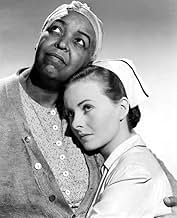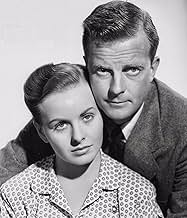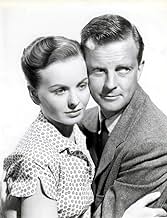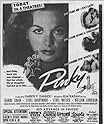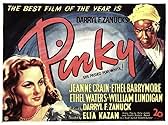IMDb RATING
7.2/10
3.6K
YOUR RATING
A light-skinned black woman falls in love with a white doctor, though he is unaware of her true race.A light-skinned black woman falls in love with a white doctor, though he is unaware of her true race.A light-skinned black woman falls in love with a white doctor, though he is unaware of her true race.
- Nominated for 3 Oscars
- 3 wins & 4 nominations total
Fred Aldrich
- Townsman
- (uncredited)
Shelby Bacon
- Boy
- (uncredited)
Betty Beard
- Minor Role
- (uncredited)
Rene Beard
- Teejore
- (uncredited)
Arthur Berkeley
- Townsman
- (uncredited)
Patsy Boniface
- Minor Role
- (uncredited)
Mildred Boyd
- Nurse
- (uncredited)
Storyline
Did you know
- TriviaJohn Ford was the original director of the film but after seeing dailies, Darryl F. Zanuck felt Ford wasn't connecting with the material. Zanuck called Elia Kazan in New York and asked him to take over the film. Kazan felt he owed Zanuck for his film career and agreed to do the movie without even looking at the script. He flew to Los Angeles and started filming the next Monday.
- GoofsWhen the white officer slaps Rozelia on the left side of her face, she mistakenly rubs the right side of her face.
- Quotes
Pinky Johnson: I'm a Negro. I can't forget it, and I can't deny it. I can't pretend to be anything else, and I don't want to be anything else. Don't you see, Tom?
Dr. Thomas Adams: No, I don't.
Pinky Johnson: You can't live without pride.
- ConnectionsFeatured in Biography: Darryl F. Zanuck: 20th Century Filmmaker (1995)
Featured review
What was fascinating and groundbreaking in 1949 is now a bit old fashioned when it comes to the film Pinky. Like Guess Who's Coming To Dinner a generation later, 20th Century Fox and director Elia Kazan went as far as they could and not hurt the box office.
Remember after all even with 'message' pictures, people have to come to the theater to see and get the message.
If it were done 20 years later someone like Lena Horne would have been cast in the part of Pinky. It was the kind of role that Lena wanted to do at MGM, but they wouldn't give her, they wouldn't be that bold. Still I can't fault Jeanne Crain's performance which got her an Oscar nomination for Best Actress. She lost the Oscar sweepstakes to Olivia DeHavilland for The Heiress.
Crain as Pinky has come home to her southern town after many years of living in the north and passing for white with her light features. As she puts she started when a train conductor escorted to the white section of a train she was riding on back when she left to go to nursing school. Of course the news that she's done that is shocking to her grandmother Ethel Waters who raised her.
It's also a culture shock to Crain to come home and relearn segregated ways after living in the north. When Sammy Davis, Jr. wrote his autobiography Yes I Can he said he learned about racism for the first time in the army. Working in show business with his dad and uncle where he was a child performer like Michael Jackson was with his brothers he was insulated from the realities of the outside world. Show business was a cocoon for Davis just as passing was for Crain's Pinky character. She has some nasty incidents including one with Nina Mae McKinney who resents what she sees as high toned ways.
Still Crain through her grandmother accepts a position to be a nurse companion to grand dame Ethel Barrymore who owns quite a bit of property. Her family is the local gentry there and Barrymore is dying. When Barrymore dies she leaves her estate, house and land to Crain and that gets her blood relatives led by Norma Varden all bent out of joint and ready to contest the will.
Which sets the film up for a trial similar to the one in To Kill A Mockingbird although this is a civil matter. The result of which you'll have to see the film for.
Besides those already mentioned look for sterling performances by Basil Ruysdael as Crain's attorney, William Lundigan as a white doctor who has fallen for Pinky, and Griff Barnett as a sympathetic doctor.
The two Ethels, Barrymore and Waters, both received Oscar nominations for Best Supporting Actress. And as luck would have it Celeste Holm and Elsa Lanchester were also nominated in that same category for Come To The Stable. So with two double nominees for two pictures, Mercedes McCambridge went right up the middle and won for her performance in All The King's Men. Made easier of course by the fact that Mercedes was also in the Best Picture of 1949.
Pinky is both old fashioned and groundbreaking. We'd never see casting like this again, but at the same time we can applaud the courage and daring it took for 20th Century Fox to make this film and for Jeanne Crain who got her career role out of it.
Remember after all even with 'message' pictures, people have to come to the theater to see and get the message.
If it were done 20 years later someone like Lena Horne would have been cast in the part of Pinky. It was the kind of role that Lena wanted to do at MGM, but they wouldn't give her, they wouldn't be that bold. Still I can't fault Jeanne Crain's performance which got her an Oscar nomination for Best Actress. She lost the Oscar sweepstakes to Olivia DeHavilland for The Heiress.
Crain as Pinky has come home to her southern town after many years of living in the north and passing for white with her light features. As she puts she started when a train conductor escorted to the white section of a train she was riding on back when she left to go to nursing school. Of course the news that she's done that is shocking to her grandmother Ethel Waters who raised her.
It's also a culture shock to Crain to come home and relearn segregated ways after living in the north. When Sammy Davis, Jr. wrote his autobiography Yes I Can he said he learned about racism for the first time in the army. Working in show business with his dad and uncle where he was a child performer like Michael Jackson was with his brothers he was insulated from the realities of the outside world. Show business was a cocoon for Davis just as passing was for Crain's Pinky character. She has some nasty incidents including one with Nina Mae McKinney who resents what she sees as high toned ways.
Still Crain through her grandmother accepts a position to be a nurse companion to grand dame Ethel Barrymore who owns quite a bit of property. Her family is the local gentry there and Barrymore is dying. When Barrymore dies she leaves her estate, house and land to Crain and that gets her blood relatives led by Norma Varden all bent out of joint and ready to contest the will.
Which sets the film up for a trial similar to the one in To Kill A Mockingbird although this is a civil matter. The result of which you'll have to see the film for.
Besides those already mentioned look for sterling performances by Basil Ruysdael as Crain's attorney, William Lundigan as a white doctor who has fallen for Pinky, and Griff Barnett as a sympathetic doctor.
The two Ethels, Barrymore and Waters, both received Oscar nominations for Best Supporting Actress. And as luck would have it Celeste Holm and Elsa Lanchester were also nominated in that same category for Come To The Stable. So with two double nominees for two pictures, Mercedes McCambridge went right up the middle and won for her performance in All The King's Men. Made easier of course by the fact that Mercedes was also in the Best Picture of 1949.
Pinky is both old fashioned and groundbreaking. We'd never see casting like this again, but at the same time we can applaud the courage and daring it took for 20th Century Fox to make this film and for Jeanne Crain who got her career role out of it.
- bkoganbing
- Feb 2, 2010
- Permalink
- How long is Pinky?Powered by Alexa
Details
- Release date
- Country of origin
- Language
- Also known as
- Lo que la carne hereda
- Filming locations
- Production company
- See more company credits at IMDbPro
Box office
- Gross US & Canada
- $4,200,000
- Runtime1 hour 42 minutes
- Color
- Aspect ratio
- 1.37 : 1
Contribute to this page
Suggest an edit or add missing content



